- Home
- Victor Hugo
The Man Who Laughs Page 7
The Man Who Laughs Read online
Page 7
He crossed the first plateau diagonally, then a second, then a third. At the extremity of each plateau the child came upon a break in the ground. The slope was sometimes steep, but always short; the high, bare plains of Portland resemble great flagstones overlapping each other. The south side seems to enter under the protruding slab. the north side rises over the next one; these made ascents, which the child stepped over nimbly. From time to time he stopped, and seemed to hold counsel with himself. The night was becoming very dark. His radius of sight was contracting. He now only saw a few steps before him.
All of a sudden he stopped, listened for an instant, and, with an almost imperceptible nod of satisfaction, turned quickly and directed his steps toward an eminence of moderate height, which he dimly perceived on his right, at the point of the plain nearest the cliff. There was on the eminence a shape which in the mist looked like a tree. The child had just heard a noise in this direction, which was the noise neither of the wind nor of the sea, nor was it the cry of animals. He thought that some one was there, and in a few strides he was at the foot of the hillock.
In truth, some one was there.
That which had been indistinct on the top of the eminence was now visible. It was something like a great arm thrust straight out of the ground; at the upper extremity of the arm a sort of forefinger, supported from beneath by the thumb, pointed out horizontally; the arm, the thumb, and the forefinger drew a square against the sky. At the point of juncture of this peculiar finger and this peculiar thumb there was a line, from which hung something black and shapeless. The line moving in the wind sounded like a chain.
This was the noise the child had heard. Seen closely, the line was that which the noise indicated, a chain--a single chain cable.
By that mysterious law of amalgamation which throughout nature causes appearances to exaggerate realities, the place, the hour, the mist, the mournful sea, the cloudy turmoils on the distant horizon, added to the effect of this figure, and made it seem enormous.
The mass linked to the chain presented the appearance of a scabbard. It was swaddled like a child, and long like a man. There was a round thing at its summit, about which the end of the chain was rolled. The scabbard was riven asunder at the lower end, and shreds of flesh hung out between the rents.
A feeble breeze stirred the chain, and that which hung to it swayed gently. The passive mass obeyed the vague motions of space. It was an object to inspire indescribable dread. Horror, which disproportions everything, blurred its dimensions while retaining its shape. It was a condensation of darkness, which had a defined form. Night was above and within the spectre; it was a prey of ghastly exaggeration. Twilight and moonrise, stars setting behind the cliff, floating things in space, the clouds, winds from all quarters, had ended by penetrating into the composition of this visible nothing. The species of log hanging in the wind partook of the impersonality diffused far over sea and sky, and the darkness completed this phase of the thing which had once been a man.
It was that which is no longer.
To be nought, yet a remainder! Such a thing is beyond the power of language to express. To exist no more, yet to persist; to be in the abyss, yet out of it; to reappear above death as if indissoluble. There is a certain amount of impossibility mixed with such reality. Thence comes the inexpressible. This being--was it a being? This black witness was a remainder, and an awful remainder--a remainder of what? Of nature first, and then of society. Nought, and yet total.
The lawless inclemency of the weather held it at its will; the deep oblivion of solitude environed it; it was given up to unknown chances; it was without defence against the darkness, which did with it what it willed. It was forever the patient; it submitted; the hurricane (that ghastly conflict of winds) was upon it.
The spectre was given over to pillage. It underwent the horrible outrage of rotting in the open air; it was an outlaw of the tomb. There was no peace for it even in annihilation: in the summer it fell away into dust, in the winter into mud. Death should be veiled, the grave should have its reserve. :Here was neither veil nor reserve: but cynically avowed putrefaction. It is effrontery in death to display its work, it offends all the calmness of shadow when it does its task outside its laboratory, the grave.
This dead being had been stripped. To strip one already stripped--relentless act! His marrow was no longer in his bones; his entrails were no longer in his body; his voice was no longer in his throat. A corpse is a pocket which death turns inside out and empties. If he ever had a Me, where was the Me? There still, perchance, and this was fearful to think of. Something wandering about something in chains--can one imagine a more mournful lineament in the darkness?
Realities exist here below which serve as issues to the unknown, which seem to facilitate the egress of speculation, and at which hypothesis snatches. Conjecture has its compelle intrare. In passing by certain places and before certain objects one can not help stopping--a prey to dreams into the realms of which the mind enters. In the invisible there are dark portals ajar. No one could have met this dead man without meditating.
In the vastness of dispersion he was wearing silently away. He had had blood which had been drunk, skin which had been eaten, flesh which had been stolen. Nothing had passed him by without taking somewhat from him. December had borrowed cold of him; midnight, horror; the iron, rust; the plague, miasma; the flowers, perfume. His slow disintegration was a toll paid to all-a toll of the corpse to the storm, to the rain, to the dews to the reptiles, to the birds. All the dark hands of night had rifled the dead.
He was, indeed, an inexpressibly strange tenant, a tenant of the darkness. He was on a plain and on a hill, and he was not. He was palpable, yet vanished. He was a shadow accruing to the night. After the disappearance of day into the vast of silent obscurity, he became in lugubrious accord with all around him. By his mere presence he increased the gloom of the tempest and the calm of stars. The unutterable which is in the desert was condensed in him. Waif of an unknown fate, he commingled with all the wild secrets of the night. There was in his mystery a vague reverberation of all enigmas.
About him life seemed sinking to its lowest depths. Certainty and confidence appeared to diminish in his environs. The shiver of the brushwood and the grass, a desolate melancholy, an anxiety in which a conscience seemed to lurk, appropriated with tragic force the whole landscape to that black figure suspended by the chain. The presence of a spectre in the horizon is an aggravation of solitude.
He was a Sign. Having unappeasable winds around him, he was implacable. Perpetual shuddering made him terrible. Fearful to say, he seemed to be a centre in space, with something immense leaning on him. Who can tell? Perhaps that equity, half seen and set at defiance, which transcends human justice. There was in his unburied continuance the vengeance of men and his own vengeance. He was a testimony in the twilight and the waste. He was in himself a disquieting substance, since we tremble before the substance which is the ruined habitation of the soul. For dead matter to trouble us, it must once have been tenanted by spirit. He denounced the law of earth to the law of heaven. Placed there by man, he there awaited God. Above him floated, blended with all the vague distortions of the cloud and the wave, boundless dreams of shadow.
Who could tell what sinister mysteries lurked behind this phantom? The illimitable circumscribed by naught, nor tree, nor roof, nor passer-by, was around the dead man. When the unchangeable broods over us, when heaven, the abyss, the life, grave, and eternity appear patent, then it is we feel that all is inaccessible, all is forbidden, all is sealed. When infinity opens to us, terrible indeed is the closing of the gate behind.
* * *
VI
STRUGGLE BETWEEN DEATH AND NIGHT
THE CHILD was before this thing, dumb, wondering, and with eyes fixed.
To a man it would have been a gibbet; to the child it was an apparition.
Where a man would have seen a corpse the child saw a spectre.
Besides, he did not understand.
<
br /> The attractions of the obscure are manifold. There was one on the summit of that hill. The child took a step, then another; he ascended, wishing all the while to descend; and approached, wishing all the while to retreat.
Bold, yet trembling, he went close up to survey the spectre. When he got close under the gibbet, he looked up and examined it.
The spectre was tarred; here and there it shone. The child distinguished the face. It was coated over with pitch; and this mask, which appeared viscous and sticky, varied its aspect with the night shadows. The child saw the mouth, which was a hole; the nose, which was a hole; the eyes, which were holes. The body was wrapped, and apparently corded up, in coarse canvas, soaked in naphtha. The canvas was mouldy and torn. A knee protruded through it. A rent disclosed the ribs; partly corpse, partly skeleton. The face was the colour of earth; slugs, wandering over it, had traced across it vague ribbons of silver. The canvas, glued to the bones, showed in relief like the robe of a statue. The skull, cracked and fractured, gaped like a rotten fruit. The teeth were still human, for they retained a laugh. The remains of a cry seemed to murmur in the open mouth. There were a few hairs of beard on the cheek. The inclined head had an air of attention.
Some repairs had recently been done; the face had been tarred afresh, as well as the ribs and the knee which protruded from the canvas. The feet hung out below.
Just underneath, in the grass, were two shoes, which snow and rain had rendered shapeless. These shoes had fallen from the dead man.
The barefooted child looked at the shoes.
The wind, which had become more and more restless, was now and then interrupted by those pauses which foretell the approach of a storm. For the last few minutes it had altogether ceased to blow. The corpse no longer stirred; the chain was as motionless as a plumb line.
Like all newcomers into life, and, taking into account the peculiar influences of his fate, the child no doubt felt within him that awakening of ideas characteristic of early years, which endeavours to open the brain and which resembles the pecking of the young bird in the egg. But all there was in his little consciousness just then was resolved into stupor. Excess of sensation has the effect of too much oil, and ends by putting out thought. A man would have put himself questions; the child put himself none; he only looked.
The tar gave the face a wet appearance; drops of pitch, congealed in what had once been the eyes, produced the effect of tears. However, thanks to the pitch, the ravage of death, if not annulled, was visibly slackened and reduced to the least possible decay. That which was before the child was a thing of which care was taken; the man was evidently precious. They had not cared to keep him alive, but they cared to keep him dead.
The gibbet was old, worm-eaten, although strong, and had been in use many years.
It was an immemorial custom in England to tar smugglers. They were hanged on the seaboard, coated over with pitch and left swinging. Examples must be made in public, and tarred examples last longest. The tar was mercy; by renewing it they were spared making too many fresh examples. They placed gibbets from point to point along the coast, as nowadays they do beacons. The hanged man did duty as a lantern. After his fashion, he guided Lois comrades, the smugglers. The smugglers from far out at sea perceived the gibbets. There is one, first warning; another, second warning. It did not stop smuggling; but public order is made up of such things. The fashion lasted in England up to the beginning of this century. In 1822 three men were still to be seen hanging in front of Dover Castle. But, for that matter, the preserving process was employed not only with smugglers. England turned robbers, incendiaries, and murderers to the same account. Jack Painter, who set fire to the government storehouses at Portsmouth,
was hanged and tarred in 1776. L'Abbé Coyer, who describes him as Jean le Peintre, saw him again in 1777; Jack Painter was hanging above the ruin he had made, and was re-tarred from time to time. His corpse lasted--I had almost said lived--nearly fourteen years. It was still doing good service in 1788; in 1790, however, they were obliged to replace it by another. The Egyptians used to value the mummy of the king; a plebeian mummy can also, it appears, be of service.
The wind, having great power on the hill, had swept it of all its snow. Herbage reappeared on it, interspersed here and there with a few thistles; the hill was covered by that close short grass which grows by the sea, and causes the tops of cliffs to resemble green cloth. Under the gibbet, on the very spot over which hung the feet of the executed criminal, was a long and thick tuft, uncommon on such poor soil. Corpses, crumbling there for centuries past, accounted for the beauty of the grass. Earth feeds on man.
A dreary fascination held the child; he remained there open-mouthed. He only dropped his head a moment when a nettle, which felt like an insect, stung his leg; then he looked up again--he looked above him at the face which looked down on him. It appeared to regard him the more steadfastly because it had no eyes. It was a comprehensive glance, having an indescribable fixedness in which there was both light and darkness, and which emanated from the skull and teeth, as well as the empty arches of the brow. The whole head of a dead man seems to have vision, and this is awful. No eyeball, yet we feel that we are looked at. A horror of worms.
Little by little the child himself was becoming an object of terror. He no longer moved. Torpor was coming over him. He did not perceive that he was losing consciousness--he was becoming benumbed and lifeless. Winter was silently delivering him over to night. There is something of the traitor in winter. The child was all but a statue. The coldness of stone was penetrating his bones, darkness, that reptile, was crawling over him. The drowsiness resulting from snow creeps over man like a dim tide. The child was being slowly invaded by a stagnation resembling that of the corpse. He was falling asleep.
On the hand of sleep is the finger of death. The child felt himself seized by that hand. He was on the point of falling under the gibbet. He no longer knew whether he was standing upright.
The end always impending, no transition between to be and not to be, the return into the crucible, the slip possible every minute. Such is the precipice which is Creation.
Another instant, the child and the dead, life in sketch and life in ruin, would be confounded in the same obliteration.
The spectre appeared to understand, and not to wish it. Of a sudden it stirred. One would have said it was warning the child. It was the wind beginning to blow again. Nothing stranger than this dead man in movement.
The corpse at the end of the chain, pushed by the invisible gust, took an oblique attitude; rose to the left, then fell back, reascended to the right, and fell and rose with slow and mournful precision. A weird game of see saw. It seemed as though one saw in the darkness the pendulum of the clock of Eternity.
This continued for some time. The child felt himself waking up at the sight of the dead; through his increasing numbness he experienced a distinct sense of fear.
The chain at every oscillation made a grinding sound, with hideous regularity. It appeared to take breath, and then to resume. This grinding was like the cry of a grasshopper.
An approaching squall is heralded by sudden gusts of wind. All at once the breeze increased into a gale. The corpse emphasised its dismal oscillations. It no longer swung, it tossed; the chain, which had been grinding, now shrieked. It appeared that its shriek was heard. If it was an appeal, it was obeyed. From the depths of the horizon came the sound of a rushing noise.
It was the noise of wings.
An incident occurred, a stormy incident, peculiar to graveyards and solitudes. It was the arrival of a flight of ravens. Black flying specks pricked the clouds, pierced through the mist, increased in size, came near, amalgamated, thickened, hastening toward the hill, uttering cries. It was like the approach of a Legion. The winged vermin of the darkness alighted on the gibbet; the child, scared, drew back.
Swarms obey words of command; the birds crowded on the gibbet, not one was on the corpse. They were talking among themselves. The croaking was frig
htful. The howl, the whistle, and the roar are signs of life; the croak is a satisfied acceptance of putrefaction. In it you can fancy you hear the tomb breaking silence. The croak is night-like in itself.
The child was frozen even more by terror than by cold.
Then the ravens held silence. One of them perched on the skeleton. This was a signal: they all precipitated themselves upon it. There was a cloud of wings, then all their feathers closed up, and the hanged man disappeared under a swarm of black blisters struggling in the obscurity. Just then the corpse moved. Was it the corpse? Was it the wind? It made a frightful bound. The hurricane, which was increasing, came to its aid. The phantom fell into convulsions. The squall, already blowing with full lungs, laid hold of it, and moved it about in all directions.
It became horrible; it began to struggle. An awful puppet, with a gibbet chain for a string. Some humourist of night must have seized the string, and been playing with the mummy. It turned and leaped as if it would fain dislocate itself; the birds, frightened, flew off. It was like an explosion of all those unclean creatures. Then they returned; and a struggle began.
The dead man seemed possessed with hideous vitality. The winds raised him as though they meant to carry him away. He seemed struggling and making efforts to escape, but his iron collar held him back. The birds adapted themselves to all his movements, retreating, then striking again, scared but desperate. On one side a strange flight was attempted, on the other the pursuit of a chained man. The corpse, impelled by every spasm of the wind, had shocks, starts, fits of rage it went, it came, it rose, it fell, driving back the scattered swarm. The dead man was a club, the swarms were dust. The fierce, assailing flock would not leave their hold, and grew stubborn; the man, as if maddened by the cluster of beaks, redoubled his blind chastisement of space. It was like the blows of a stone held in a sling. At times the corpse was covered by talons and wings; then it was free. There were disappearances of the horde; then sudden furious returns. A frightful torment continuing after life was past. The birds seemed frenzied. The airholes of hell must surely give passage to such swarms. Thrusting of claws, thrusting of beaks, creakings, rendings of shreds no longer flesh, creakings of the gibbet, shudderings of the skeleton, jingling of the chain, the voices of the storm and tumult. What conflict more fearful? A hobgoblin warring with devils! A combat with a spectre!

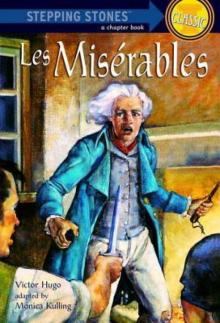 Les Miserables
Les Miserables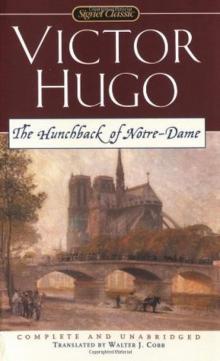 The Hunchback of Notre-Dame
The Hunchback of Notre-Dame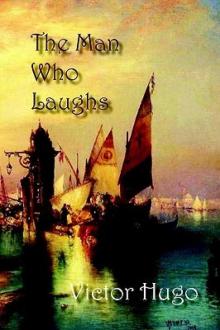 The Man Who Laughs
The Man Who Laughs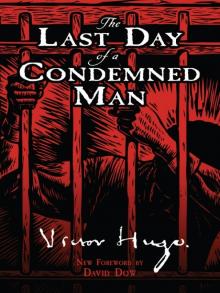 The Last Day of a Condemned Man
The Last Day of a Condemned Man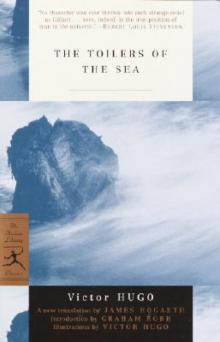 The Toilers of the Sea
The Toilers of the Sea Waterloo
Waterloo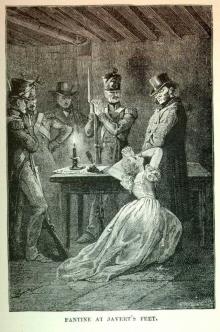 Les Misérables, v. 1/5: Fantine
Les Misérables, v. 1/5: Fantine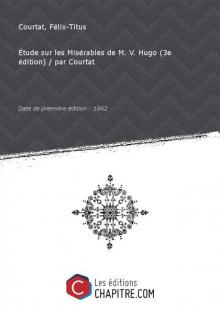 Les Misérables, v. 3/5: Marius
Les Misérables, v. 3/5: Marius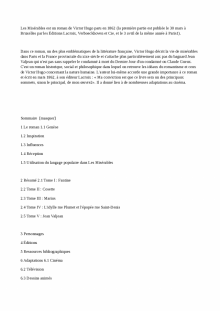 Les Misérables, v. 2/5: Cosette
Les Misérables, v. 2/5: Cosette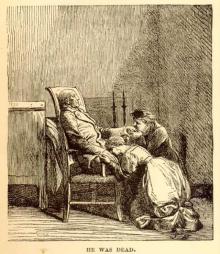 Les Misérables, v. 5/5: Jean Valjean
Les Misérables, v. 5/5: Jean Valjean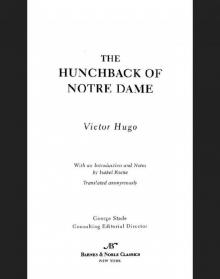 Hunchback of Notre Dame (Barnes & Noble Classics Series)
Hunchback of Notre Dame (Barnes & Noble Classics Series)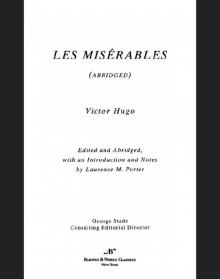 Les Miserables (abridged) (Barnes & Noble Classics Series)
Les Miserables (abridged) (Barnes & Noble Classics Series)